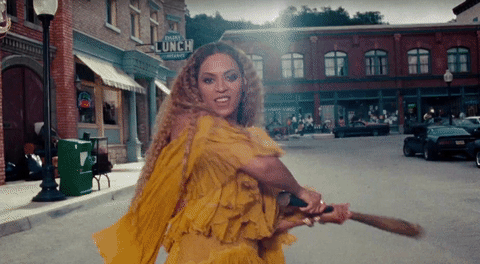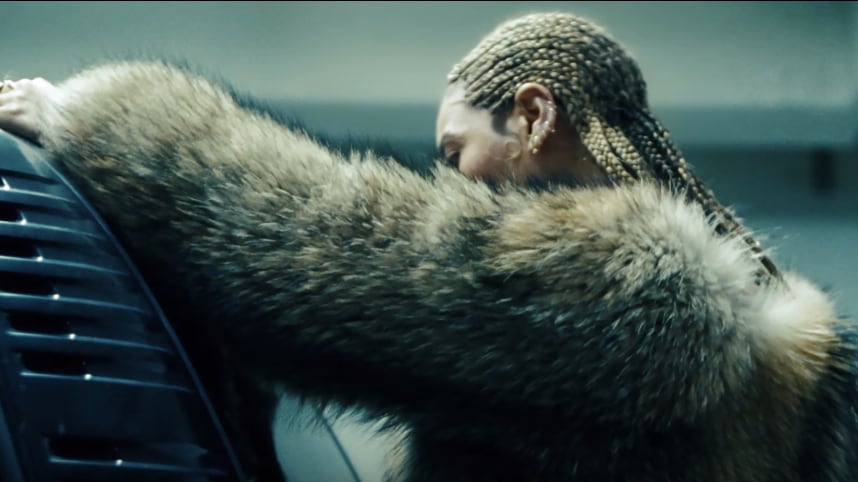The doves cried. And when they were done mourning, they smiled. And then they sang. They saaang.
And their song, 12 of them, actually, called us.
They called us back from the bar on a Saturday night. They called us back from our eulogies and our nostalgia and our thinkpiecing (well, briefly... this is a Beyoncé album after all). They called us to introspection, to speculation, and, most fiercely, to action. They called us to formation.
ADVERTISEMENT
We followed our marching orders, obsessing en masse Saturday night over Lemonade, the landmark HBO televised event that coincided with a full-on visual album release.
Honestly, the second half of that sentence is utter nonsense. What’s a televised event? What’s a visual album?
When you see her, ask Beyoncé.
Lemonade—as The Daily Beast and the entire Internet has already reported—teased, trolled, and titillated all of us with allusions to Jay Z’s long-rumored cheating.
Those allusions are so shady, and epic, and cathartic, and, ultimately, frustrating. Is Beyoncé about to divorce Jay Z, or are they happily raising Blue Ivy together? Or was all of this really in reference to her mom’s relationship to her father? Again, when you see her please ask her.
So there’s Lemonade, the visual album, whatever that is. (By the way, it’s powerful, and feminist, and unapologetically black, and transfixing, and gorgeous, and assured, and weird, and confusing, and dumb, and groundbreaking.) But hey: Is the music any good?
After all, this is Beyoncé, the hits maven. This is the woman behind two of the greatest pop songs of our generation (“Crazy in Love” and “Single Ladies,” by the way. But it’s a testament to her reign that you might have wondered which two of the many contenders I was referring to.)
This is the woman who dropped a surprise album in 2013 and completely reinvented and reinvigorated her image, as a pop star who was also an artist. As an icon who was also a human. As a sex symbol who was also sexual, and a female who was also a feminist.
This is the woman who, at the height of her career and influence, dropped a song and music video that wasn’t just a call to the dance floor but a call to arms.
“Formation,” which closes out Lemonade, was and still is a booming meditation on black identity, the validity and transience of a person’s roots and history, and the crushing interplay between power and helplessness—agency and victimization.
It’s also fire. A jam.
After “Formation,” and after reports of Beyoncé spending time filming with the mothers of Trayvon Martin and Mike Brown, many thought that the singer’s new album was going to be political. While those visual elements of Lemonade, particularly the “Resurrection” section, certainly confirm that speculation, there’s no doubt that the music on the album is far more personal than it is political.
The visual album strikes an engaging balance between personal and performative.

There are home videos and winking (well, not so much winking as shady side-eye) references to home life and gossip-rag narratives. There are also exquisitely shot mini films and music videos. There are intimate and voyeuristic references to her past and present. And there are films invoking our—specifically Beyoncé’s—cultural history and where she wants to take us into the future.
That future includes some of the most personal music that Beyoncé has ever made. It includes the most daringly genre-hopping music she’s ever produced—and, because of that, oddly both the most universal and also the most alienating album she’s released.
It’s an album that is both confessional and also, at times, seemingly so baiting that it reads as disingenuous.
It’s experimental in a way that Beyoncé shouldn’t feel the need to be at this point in her career, yet also not as assured as the buildup to the album (not to mention the “Yaaas” heard ’round the world when it was released) would lead you to believe it would be.
Yet it’s an album that has Bey doing stripped-down ballads, pop-chart hits, reggae, rock, and, if you’d believe it, the best country music we’ve heard this year.
Lemonade is as refreshing as it is jarring. It’s, well, it’s like lemonade in that respect: so smooth and delicious you crave it, yet so so bitter and strong you pucker after a gulp and ponder if you’re ready for another sip.
It begins, quite appropriately given the tragic news of the past week, with Beyoncé cooing. “Pray You Catch Me” releases the doves, a gospel-tinged ballad that serves just as well as an elegy for the spirit we’re saying goodbye to as a rousing buildup for the transformation we’re about to experience.
In a meta way, that’s a goodbye to Prince and a hello to the artist probably most culturally apt to be his successor. But it’s also a spiritual empowering of a woman about to, over the course of the next 11 songs, stand up for herself, for her dignity, for her sisters, for her race, and, eventually, for justice.
Whether you interpret Lemonade as a 12-track therapy session singing through Bey’s feelings about Jay Z’s rumored cheating and all those divorce rumors, or more simply a collection of fiercely feminist—if slightly vengeful—songs, the track is beautiful. And its closing line—”What are you doing, my love?”—sets you up for what is certainly an awakening.

Suspicion reigns on “Hold Up,” a reggae-tinged warning shot at a two-timing lover. “How did it come to this / Going through your call list / I don’t wanna lose my pride but I’mma fuck me up a bitch.” Oh lord, is this juicy if you listen to it through the prism of Bey and Jay. But if you just listen to it through your headphones? Oh it’s the song of the summer.
The brilliance of Lemonade, its perhaps overly knowing lyrics aside, is its chameleonic tone. Beyoncé was remarkable for how heavily the pop supernova leaned into grit and sonic messiness, all in the name of art.
Lemonade doesn’t hurl itself toward any genre in a statement of artistry. Instead it masters... um, all of them, but in turn doesn’t make the same powerful statement of Beyoncé’s artistic mission, like her last album did.
“Don’t Hurt Yourself,” featuring Jack White, boasts maybe the most exciting female rock vocals we’ve heard this year. It just happens that those rock vocals belong to, of all people, Beyoncé, who sings more passionately on this than anything we’ve heard from an artist so trained to be polished.
“6 Inch,” which features The Weeknd, has all the danger and sonic ominousness of a modern R&B song, all ready to soundtrack your future film femme fatale as she struts her way to revenge.
It’s intensely interesting, but it’s no hit. No, the hits are “Sorry” and “Daddy Lessons.”
“Sorry,” contrary to its name, is poised to be an unapologetic anthem. It’s a hashtag soundtrack for a generation of #DGAF specialists, with lyrics like “Middle fingers up / Put ’em hands up high / Wave ’em in his face / Tell him ‘boy, bye’” coaching us through our kiss-offs.
And “Daddy Lessons” is such a good country music song you don’t know whether to marvel at Beyoncé’s talents as a genre mimic or shrug your shoulders “duh” that this Texas girl was a country queen all along.
From the lyrics, reminiscing about all the ways (good and bad) her father made her who she is, to the easy twang she injects her vocals with, it’s so spot-on country that you’re torn between bowing down to the woman who can truly master anything or begrudge an artist who, on this supposedly personal album, hasn’t defined a voice or a sound for us to tease a character assessment out of.

The second half of the album jolts with a war march—the soulful, stormy soul stirring of “Freedom” pairing intensely and politically with “Formation.” Then there’s the soothing yin to their spiritually agitated yang.
“All Night,” with all its classically Beyoncé elements—the horns, the belts that fade into lilts, the air of comforting—is blissful and romantic where “Sandcastles,” quite possibly the most affecting and wrenching ballad the singer has ever done, is desperate and devastating.
The perfection of the former and the emotional rawness of the latter paints a picture of the Beyoncé we’re finally meeting, the real one: a woman who has all the gifts to be #flawless, but all the human insecurities and fallibility that allows you to be drunk in love.
You can’t talk about this album without acknowledging its surprising vulgarity and language, which Beyoncé is absolutely entitled to use in her art and her expression of womanhood, but, because of her public primness and often calculated nature we see her in, can seem inauthentic. In the same way her assorted genre mastery can seem like an artist not committed to a singular voice, the explicit content, from her mouth, can seem more theatrical than genuine.
That said, it’s certainly powerful.
It’s somewhat fitting that Lemonade greets us in a state of mourning. A visual album, an event, and a triumph of empowering, sexual, genre non-specific music, the work is in the tradition of Prince, an artist who played with norms of distribution and aural expectations as much as he did with the issues of identity, confidence, and openness that Beyoncé explores on this album.
Dearly beloved, we are gathered here to celebrate music that matters. When life give us occasion to gather together for music’s sake, both in sadness and, this Saturday night, in ecstasy, you take advantage. You make Lemonade.






